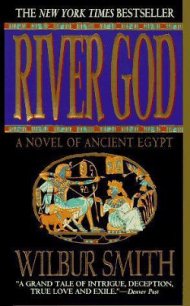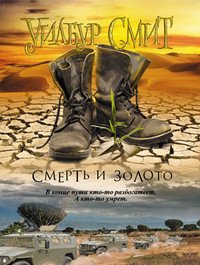Men of Men - Smith Wilbur (онлайн книга без txt) 📗
"I see you also, Kamuza."
And they made a place for Kamuza in the circle, not pressing him too closely, giving him space, for now Kamuza wore the simple black tiara upon his close-cropped pate, the badge of the Councillor, the induna of the king of Matabeleland.
They called him "Baba", a term of great respect, and even Bazo clapped his hands softly in greeting and passed him the beer pot.
only after Kamuza had refreshed himself could Bazo begin to ask the questions of home, disguising his eagerness behind measured tones and an expression of calm dignity.
Kamuza was no longer a youth, neither of them were; the years had sped away and they were both in the full flowering of their manhood. Kamuza's features were sharper than the true Matabele of Zanzi blood, the old blood from Zululand, for his was mixed with Tswana, the less warlike but shrewd and cunning peoples of King Khama.
Kamuza's grandmother had been captured as a maiden, still short of puberty, by one of King Mzilikazi's raiding impis, and taken to wife by the induna who commanded her captors. From her Kamuza had inherited his mulberry black skin and the Egyptian slant of his eyes, the row nostrils and the thin and knowing twist of his nar lips.
There were very few Matabele who could still trace their bloodline back to the pure Zanzi, to the line of Chaka and Dingaan, the Zulus, the Sons of Heaven, and Bazo was one of those. Yet it was Kamuza who wore the ring of the induna on his head now.
in the time of Mzilikazi, a man would have the hoar frost of wisdom and age powdering his hair, and the cowtails bound about his elbows and knees would proclaim his deeds in battle to the world before the king ordered him to take the isicoco. Then his wives would plait and twist the headring into his own hair and cement it permanently into place with gum and clay and ox blood, a permanent halo of honour that entitled the wearer to his seat on the Council of the Matabele nation.
However, the old times were changing. More cunning than fierce, Lobengula, son of Mzilikazi, looked for cunning in those about him. Mzilikazi had been a warrior and lived by the white flash of the assegai. Lobengula, though he had blooded his spear, had never been a warrior, and he scorned the warriors" simpleness of thought and directness of action. As his father's greybeards faltered, he replaced them with men who thought as swiftly as the old ones had stabbed.
He had no patience with the old men's preoccupation with a world that was passing, and he sought out the young ones with clear fresh eyes, men who could see with him the dark clouds gathering on the southern borders like the soaring thunderheads of high summer.
Men who could sense the change and terrible events which his wizards and his own divinations warned him would soon rush down upon him like the fires that sweep the papyrus beds of the Zambezi swamps at the end of the dry season.
Lobengula, the great Black Elephant, whose very tread shakes the earth's foundations, and whose voice splits the skies, was choosing young men with eyes to see and ears to hear.
Thus Kamuza now wore the isicoco of the induna and, as he spoke over the fire in his dry whisper, his slanted eyes black and bright as those of a mamba in the firelight, men listened, and listened with great attention.
It was a measure of the gravity of the news he carried from the north that Kamusa began the council, the indaba, with a recital of the history of the Matabele nation. Each of them had heard it first with their mother's breast in their mouths, had drunk it in with her milk, but they listened now as avidly as then, reinforcing their memories so that when the time came they would be able to repeat it perfectly in each detail to their own children, that the story might never be lost.
The history began with Mzilikazi, war chief of the impis of Zulu, warrior without peer, beloved comrade and trusted intimate of King Chaka himself. it told of the black sickness of King Chaka, driven mad with grief at the death of his mother Nandi, the Sweet One. Chaka ordering the year of mourning in which no man might sow seed, on pain of death; in which the milk from the cows must be thrown upon the earth, on pain of death; in which no man might lie with his woman, on pain of death.
Mad Chaka brooded in his great hut and looked for cause to strike down all around him, even the most trusted, even the most beloved.
So it was that Chaka's messengers came to Mzilikazi, the young war chieftain. They found him in the field with. his impis about him, five thousand of Zululand's bravest and finest, all of them still hot from battle, driving before them the spoils they had taken, the captured herds, the young and comely girls roped neck to neck.
The king's messengers wore the long tail feathers of the stately blue cranes in their headdress, token of their solemn mission.
"The king accuses the induna Mzilikazi," began the first messenger, and looking into his arrogant face Mzilikazi knew that he looked upon the face of death. "The king accuses Mzilikazi of stealing the king's share of the spoils of war."
Then the second messenger spoke, and his words were an echo of the king's black madness, so that the words of King Chaka stood in the air above Mzilikazi's impis the way that the vultures circle above the battlefields on wide and motionless pinions.
if the sentence of death had been upon him alone, Mzilikazi might have gone to his king and met it with courage and dignity. But his five thousand fighting men were doomed also, and Mzilikazi called them his children.
So Mzilikazi reached out and seized the king's messengers, and for a moment the earth seemed to lurch in its courses, for to touch these who wore the blue crane feathers was to touch the person of the king himself. With the razor edge of his assegai, Mzilikazi slashed the blue feathers from their heads, and threw them into the faces of the grovelling messengers.
"That is my reply to Chaka., who is no longer my king.
Thus began the great exodus towards the north and, seated over the watch-fire, Kamuza, the king's man, related it all again.
He told the battle honours of Mzilikazi, the renegade.
He told how Chaka sent his most famous impis after the fleeing five thousand, and how Mzilikazi met them in the classic battle tactics of the Nguni, how he waited for them in the bad ground.
Kamuza told how Mzilikazi threw the "horns of the bull" around the impis of Chaka, and how his young men shouted "Ngi Ala! I have eaten!"
as they drove in the steel; and the listeners in the dark hut murmured and moved restlessly, and their eyes shone and their spear hands twitched.
When it was over, the survivors of Chaka's shattered impi came to Mzilikazi and, on their knees, swore allegiance to him, to Mzilikazi who was no longer a renegade, but a little king.
Kamusa told how the little king marched north with his swollen impi, and how he defeated other little kings and became a great king.
Kamusa told how after Chaka was murdered by his brothers, Dingaan, the new leader of the Zulu nation, did not dare to send out more impis to pursue Mzilikazi.
So Mzilikazi flourished, and like a ravaging lion he ate up the tribes. Their warriors swelled his fighting impis, and his Zanzi, the pure-blooded Zulu, bred upon the bellies of the captured maidens and the Matabele became a nation and Mzilikazi became a black emperor whose domain overshadowed even that of Chaka.
The men about the fire listened and felt their hearts swell with pride.
Then Kamusa told how the buni, the strange white men, crossed the river in their little wagons and outspanned upon the land that Mzilikazi had won with the assegai. Then Mzilikazi paraded his impis, and they danced with their war plumes aflutter, and their long shields clashing as they passed before him.




